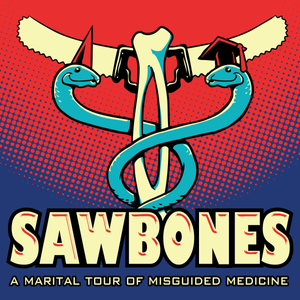
Capgras: the 'Illusion of Doubles'
12/10/18 • 14 min
Clinical psychologist Professor Daniel Freeman explores historic and contemporary cases of delusions – a belief that is impossible, incredible or false; is held with a high degree of certainty; and endures despite evidence to the contrary.
In this programme he examines the 'Capgras Delusion' or the 'Illusion of Doubles'.
In 1923 the French psychiatrist Joseph Capgras first described the delusion which later took his name. The case study concerned his patient, Madame M, who claimed that her husband and children had been substituted for doubles.
Daniel also talks to a contemporary contributor who shares her experience of a delusion that she was in a reality show.
Produced by Victoria Shepherd and Eve Streeter A Greenpoint Production for BBC Radio 4
Clinical psychologist Professor Daniel Freeman explores historic and contemporary cases of delusions – a belief that is impossible, incredible or false; is held with a high degree of certainty; and endures despite evidence to the contrary.
In this programme he examines the 'Capgras Delusion' or the 'Illusion of Doubles'.
In 1923 the French psychiatrist Joseph Capgras first described the delusion which later took his name. The case study concerned his patient, Madame M, who claimed that her husband and children had been substituted for doubles.
Daniel also talks to a contemporary contributor who shares her experience of a delusion that she was in a reality show.
Produced by Victoria Shepherd and Eve Streeter A Greenpoint Production for BBC Radio 4
Previous Episode

A Paranoid Conspiracy: James Tilly Matthews and the Air Loom Gang
Clinical psychologist Daniel Freeman explores cases of delusion from the archives and speaks to people who have experienced them first-hand.
In this programme, Daniel examines the most common type of delusion – paranoia. The incorrect belief that others are observing you and may be trying to harm you.
Occasionally in the archives, cases emerge that allow us to see what such a delusion might have meant on an existential level for a person suffering from it. One of them is the case of James Tilly Matthews. A London tea broker who was committed to Bethlem psychiatric hospital in 1797, Tilly Matthews became convinced of an elaborate conspiracy involving the British establishment and a mind-controlling machine called the Air Loom. He is considered to be the first fully documented case of paranoid schizophrenia.
Developing the understanding and treatment of paranoia has been the focus of Daniel's work as a clinical psychologist at the University of Oxford. Deciding whether to trust or mistrust is a vital aspect of human cognition, but accurate judgment of others’ intentions is often challenging. At a cultural level, a fear of others is variably connected to the political and social climate.
At the heart of the severest paranoia - persecutory delusions - is the unfounded belief in an ongoing threat from others. In people seen in clinical services with a diagnosis of schizophrenia, the fears can also be provoked by hearing negative voices (auditory hallucinations).
Daniel meets Toby, who volunteered to share his own experience of a paranoid delusion, and the isolation that takes hold as a consequence.
Produced by Victoria Shepherd and Eve Streeter A Greenpoint production for BBC Radio 4
Next Episode

Grand Passions
Psychologist and therapist Professor Daniel Freeman explores the history of delusions - strongly held, preoccupying false beliefs – with cases from the archives and first-hand testimonies from people who have experienced delusional thinking. Conversations usually confined to the clinic room.
In recent years, delusions have started to emerge as a field of study in their own right, and Daniel has been at the forefront of new research and treatment for the past 20 years. His aim is to make delusions more understandable and explicable.
In this programme Daniel hears how in 1921, Gaetan Gatien De Clerambault, a French psychiatrist, published a landmark paper detailing the delusion that became commonly known as ‘erotomania’. The case study featured ‘Lea Anne B’ a 53-year-old milliner who became convinced that the English King George V was in love with her.
And a contemporary contributor shares her experience of the belief that she had to save the world from the Millennium Bug.
Produced by Victoria Shepherd and Eve Streeter A Greenpoint production for BBC Radio 4
If you like this episode you’ll love
Episode Comments
Generate a badge
Get a badge for your website that links back to this episode
<a href="https://goodpods.com/podcasts/a-history-of-delusions-6666/capgras-the-illusion-of-doubles-245345"> <img src="https://storage.googleapis.com/goodpods-images-bucket/badges/generic-badge-1.svg" alt="listen to capgras: the 'illusion of doubles' on goodpods" style="width: 225px" /> </a>
Copy




